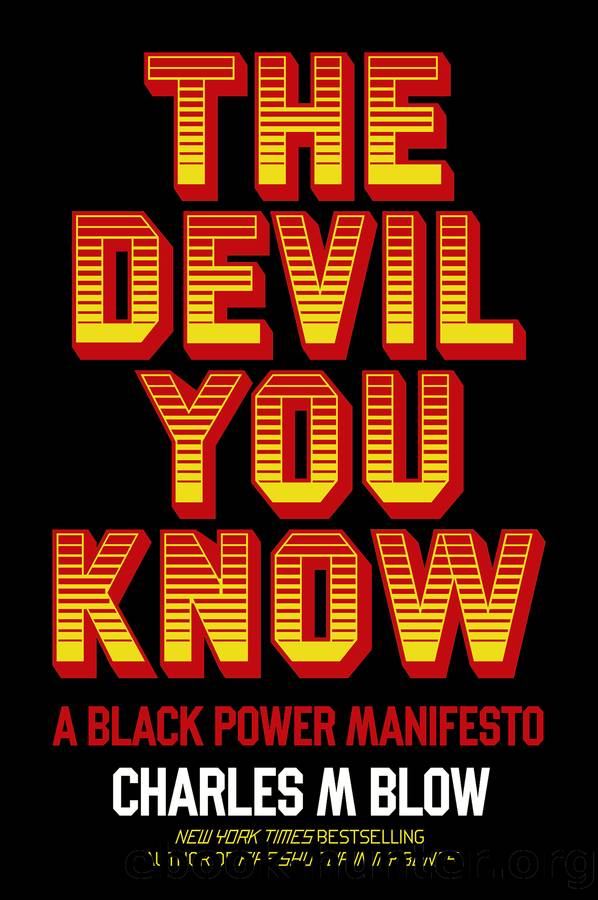The Devil You Know by Charles M. Blow

Author:Charles M. Blow
Language: eng
Format: epub
Publisher: Harper
Published: 2021-01-26T00:00:00+00:00
Black density wouldnât prove beneficial only for political reasons. Black people also need to reunite to combine purchasing power, brainpower, and cultural power. Our dispersal has exposed us to exploitation, for which density could be curative.
Black people are heavy users of social media, particularly as an instrument for activism. A 2018 Pew Research Center survey found that Black people, more than others, value social media as a way to amplify lesser-covered stories, to get involved with issues, to find others who share their views, to give voice to underrepresented voices, and to achieve political goals.26 But, not only are there no Black CEOs at the major tech companies, there are only a handful of Black executives, and the percentage of minorities employed by most of them is abysmal. According to a 2018 analysis by Recode, Microsoft, Intel, Twitter, Facebook, Pinterest, and Google, Black people represented less than 4 percent of their total workforces.27 When Adweek published its 2018 Power List of â100 cutting-edge marketers, media CEOs, brand champions and tech titans,â there wasnât a single Black person on it.28
The majority of players in the National Football League (the most profitable sports league in America) and the National Basketball Association are Black, 65 percent and 75 percent respectively29âhowever, as of October 2020, there isnât a single Black owner of an NFL team, and only one Black owner of an NBA one, Michael Jordan. The NFL just, in 2020, saw its first Black president of a team, with the appointment of Jason Wright by the Washington Football Team.30 These leagues generate billions of dollars in revenue, and only a portion redounds to the athletes and almost none to the Black communities that nurtured them.
Furthermore, historically Black colleges and universities, which still produce nearly a quarter of all Black graduates with an undergraduate degree,31 receive little of the benefit from these athletesâ talents. Instead that Black talent draws billions of dollars of revenue to overwhelmingly white schools and media groups. The NCAA, television networks, and Division I schoolsâalmost all majority whiteâmake billions of dollars off of these athletes.
As Jemele Hill points out in The Atlantic:
Bringing elite athletic talent back to Black colleges would have potent downstream effects. It would boost HBCU revenues and endowments; stimulate the economy of the black communities in which many of these schools are embedded; amplify the power of black coaches, who are often excluded from prominent positions at predominantly white institutions; and bring the benefits of black labor back to black people.32
Download
This site does not store any files on its server. We only index and link to content provided by other sites. Please contact the content providers to delete copyright contents if any and email us, we'll remove relevant links or contents immediately.
Blood and Oil by Bradley Hope(1260)
Daniel Holmes: A Memoir From Malta's Prison: From a cage, on a rock, in a puddle... by Daniel Holmes(1127)
Ambition and Desire: The Dangerous Life of Josephine Bonaparte by Kate Williams(1097)
Wandering in Strange Lands by Morgan Jerkins(1024)
It Was All a Lie by Stuart Stevens;(953)
What Really Happened: The Death of Hitler by Robert J. Hutchinson(885)
London in the Twentieth Century by Jerry White(858)
Time of the Magicians by Wolfram Eilenberger(850)
Twilight of the Gods by Ian W. Toll(824)
The First Conspiracy by Brad Meltzer & Josh Mensch(820)
The Japanese by Christopher Harding(811)
A Woman by Sibilla Aleramo(805)
Lenin: A Biography by Robert Service(786)
The Devil You Know by Charles M. Blow(785)
Reading for Life by Philip Davis(782)
Twelve Caesars by Mary Beard(780)
Cleopatra by Alberto Angela(779)
1965--The Most Revolutionary Year in Music by Andrew Grant Jackson(721)
The Life of William Faulkner by Carl Rollyson(720)
